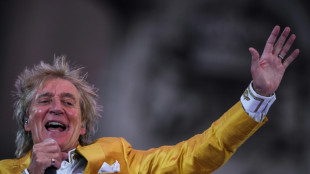
-
 French court cracks down on Corsican language use in local assembly
French court cracks down on Corsican language use in local assembly
-
Prosecutors seek up to 14-year terms for French rape trial defendants

-
 Russia expels UK diplomat accused of espionage
Russia expels UK diplomat accused of espionage
-
Israeli security cabinet to discuss ceasefire as US says deal 'close'

-
 COP29 president blames rich countries for 'imperfect' deal
COP29 president blames rich countries for 'imperfect' deal
-
Stocks retreat, dollar mixed on Trump tariff warning

-
 No regrets: Merkel looks back at refugee crisis, Russia ties
No regrets: Merkel looks back at refugee crisis, Russia ties
-
IPL history-maker, 13, who 'came on Earth to play cricket'

-
 Ukraine says Russia using landmines to carry out 'genocidal activities'
Ukraine says Russia using landmines to carry out 'genocidal activities'
-
Prosecutors seek up to 12-year terms for French rape trial defendants

-
 'Record' drone barrage pummels Ukraine as missile tensions seethe
'Record' drone barrage pummels Ukraine as missile tensions seethe
-
Laos hostel staff detained after backpackers' deaths

-
 Hong Kong LGBTQ advocate wins posthumous legal victory
Hong Kong LGBTQ advocate wins posthumous legal victory
-
Ukraine says cannot meet landmine destruction pledge due to Russia invasion

-
 Rod Stewart to play Glastonbury legends slot
Rod Stewart to play Glastonbury legends slot
-
Winter rains pile misery on war-torn Gaza's displaced

-
 'Taiwan also has baseball': jubilant fans celebrate historic win
'Taiwan also has baseball': jubilant fans celebrate historic win
-
Russia pummels Ukraine with 'record' drone barrage

-
 Paul Pogba blackmail trial set to open in Paris
Paul Pogba blackmail trial set to open in Paris
-
China's Huawei unveils 'milestone' smartphone with homegrown OS

-
 Landmine victims gather to protest US decision to supply Ukraine
Landmine victims gather to protest US decision to supply Ukraine
-
Indian rival royal factions clash outside palace

-
 Equity markets retreat, dollar gains as Trump fires tariff warning
Equity markets retreat, dollar gains as Trump fires tariff warning
-
Manga adaptation 'Drops of God' nets International Emmy Award

-
 China's Huawei launches 'milestone' smartphone with homegrown OS
China's Huawei launches 'milestone' smartphone with homegrown OS
-
Philippine VP denies assassination plot against Marcos

-
 Four Pakistan security forces killed as ex-PM Khan supporters flood capital
Four Pakistan security forces killed as ex-PM Khan supporters flood capital
-
Hong Kong's legal battles over LGBTQ rights: key dates

-
 US lawmakers warn Hong Kong becoming financial crime hub
US lawmakers warn Hong Kong becoming financial crime hub
-
Compressed natural gas vehicles gain slow momentum in Nigeria

-
 As Arctic climate warms, even Santa runs short of snow
As Arctic climate warms, even Santa runs short of snow
-
Plastic pollution talks: the key sticking points

-
 Indonesia rejects Apple's $100 million investment offer
Indonesia rejects Apple's $100 million investment offer
-
Pakistan police fire tear gas, rubber bullets at ex-PM Khan supporters

-
 Ronaldo double takes Al Nassr to brink of AFC Champions League last 16
Ronaldo double takes Al Nassr to brink of AFC Champions League last 16
-
Pakistan police fire tear gas, rubber bullets at pro-Khan supporters

-
 Hong Kong same-sex couples win housing, inheritance rights
Hong Kong same-sex couples win housing, inheritance rights
-
Indonesia digs out as flooding, landslide death toll hits 20

-
 Liverpool's old guard thriving despite uncertain futures
Liverpool's old guard thriving despite uncertain futures
-
Mbappe takes reins for Real Madrid in Liverpool clash

-
 As AI gets real, slow and steady wins the race
As AI gets real, slow and steady wins the race
-
China's Huawei to launch 'milestone' smartphone with homegrown OS

-
 Porzingis and Morant make triumphant NBA returns
Porzingis and Morant make triumphant NBA returns
-
Hong Kong top court affirms housing, inheritance rights for same-sex couples

-
 Philippines, China clashes trigger money-making disinformation
Philippines, China clashes trigger money-making disinformation
-
Most Asian markets drop, dollar gains as Trump fires tariff warning

-
 England 'not quivering' ahead of New Zealand Test challenge
England 'not quivering' ahead of New Zealand Test challenge
-
Bethell to bat at three on England Test debut against New Zealand

-
 Trump vows big tariffs on Mexico, Canada and China
Trump vows big tariffs on Mexico, Canada and China
-
New Zealand and England to play for Crowe-Thorpe Trophy


Freud, a 'mad' president and a century of European diplomacy
Finding a lost manuscript by Sigmund Freud has caused a French historian to revisit a key moment in European diplomacy 100 years ago that reverberates today as war returns to the continent.
"Le President est-il devenu fou?" (Has the president gone mad?) by Patrick Weil takes a fresh look at US president Woodrow Wilson (1913-21), who helped forge the Treaty of Versailles after World War I and tried to establish lasting peace through the creation of the League of Nations.
Wilson, of course, failed: the treaty's harsh conditions on Germany created resentment that helped fuel the rise of the Nazis.
Nor could he convince his colleagues in Washington to approve the treaty -- it was never ratified by the US, dooming the League of Nations at birth.
Back in the 1930s, Freud, the godfather of psychoanalysis, blamed Wilson's failure on messianic hubris, rooted in his repressed homosexuality and obsession with his father.
His text was not published until the 1960s, long after his death, and was rubbished by US reviewers, with The New Republic calling it either "a mischievous and preposterous joke... or else an awful and unrelenting slander upon a remarkably gifted American president".
But Weil says there may be something to Freud's critique.
- 'Hysteria' -
Whenever things went against Wilson, Weil writes, "he would plunge into hysteria", blaming everyone but himself.
Frequent minor strokes throughout Wilson's life may also have affected his sanity and undermined his ability to conclude the deal.
Certainly, many of his contemporaries, including British leader Winston Churchill and later US president Franklin Roosevelt, considered Wilson to be "crazy", Weil told AFP in an interview.
They kept that quiet, he said, because Wilson's reputation was important in building momentum behind the creation of the United Nations after World War II.
Weil uncovered Freud's original manuscript in an unmarked box in the archives of Yale University.
Freud had co-written his tract with a US diplomat, William Bullitt, and the original shows that some 300 changes were made by Bullitt before it was finally published in the 1960s, cutting many key psychological insights.
Weil uses his finding to help reassess the debate around the Treaty of Versailles -- a story with grim relevance now as the world seeks ways to negotiate with Russia.
"One can't help noticing how the personality of certain leaders plays a role in the dangers faced by the world -- today as much as yesterday," he said.
- 'NATO before the fact' -
France's prime minister in 1919, Georges Clemenceau, is often blamed for pushing too hard to punish Germany, wanting to crush any chance of its resurgence -- a move that spectacularly backfired.
But Weil puts a different spin on events, having dug up documents that show that France's primary aim was to win security guarantees from the US and Britain -- a sort of early form of NATO -- in case of future German aggression.
"It is NATO before the fact, and it is a French request to create it," Weil said.
Wilson's failure to see the importance of a defence pact -- or to convince his colleagues in Washington -- ultimately doomed Europe to more war, he argues.
"It was an obsession of Roosevelt (during World War II) not to commit the same mistakes," said Weil.
"What's important in today's context is that the leaders in 1945 had that experience of 1919. Churchill, Roosevelt -- they were there (at Versailles).
"They had that experience that today's leaders do not."
M.Odermatt--BTB
